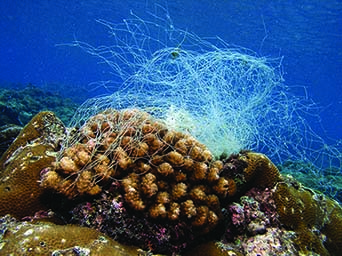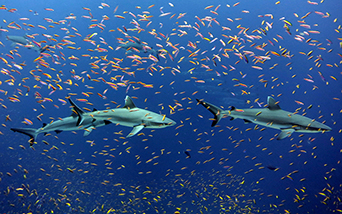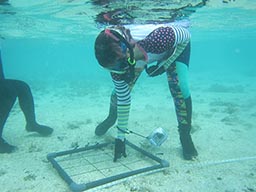- ABOUT US
- PROGRAM AREAS
- CONSERVATION APPROACH
- EDUCATION
- MULTIMEDIA
- NOAA Coral Reef Information System: Fisheries
- NOAA Coral Reef Watch
- NOAA Habitat Focus Areas
- NOAA Fisheries: Conserving Habitat in the Pacific
- NOAA Fisheries: Conserving Habitat in the Southeast
- NOAA Office of National Marine Sanctuaries: Science
- NOAA National Centers for Coastal Ocean Science: Stressor Impacts and Mitigation
Improve Fisheries Sustainability

Coral reef ecosystems support important commercial, recreational, and subsistence fishery resources in the U.S and its territories. Fishing also plays a central social and cultural role in many island and coastal communities, where it is often a critical source of food and income.
The impacts from unsustainable fishing on coral reef areas can lead to the depletion of key reef species in many locations. Such losses often have a ripple effect, not just on the coral reef ecosystems themselves, but also on the local economies that depend on them. Additionally, certain types of fishing gear can inflict serious physical damage to coral reefs, seagrass beds, and other important marine habitats.
Coral reef fisheries, though often relatively small in scale, may have disproportionately large impacts on the ecosystem if conducted unsustainably. Rapid human population growth, increased demand, use of more efficient fishery technologies, and inadequate management and enforcement have led to the depletion of key reef species and habitat damage in many locations.
What We Are Doing

Minimizing negative fishing impacts is critical to revitalizing and protecting coral reef resources for current and future generations. Given the many entities with jurisdiction over U.S. coral reef resources, cooperation among partners is essential.
The NOAA Coral Reef Conservation Program works with partners to increase the abundance and average size of key reef fishery species. We also develop products and tools to support the creation and management of marine protected areas, improve compliance with management regulations, and increase public understanding of fishing impacts on coral reefs.
Response to Unsustainable Fisheries throughout NOAA
About Us

The NOAA Coral Reef Conservation Program was established in 2000 by the Coral Reef Conservation Act. Headquartered in Silver Spring, Maryland, the program is part of NOAA's Office for Coastal Management.

The Coral Reef Information System (CoRIS) is the program's information portal that provides access to NOAA coral reef data and products.
Work With US
U.S. Coral Reef Task Force
Funding Opportunities
Employment
Fellowship Program
Contracting Assistance
Graphic Identifier
Featured Stories Archive

Access the archive of featured stories here...
Feedback
Thank you for visiting NOAA’s Coral Reef Conservation Program online. Please take our website satisfaction survey. We welcome your ideas, comments, and feedback. Questions? Email coralreef@noaa.gov.
Stay Connected
Contact Us
NOAA’s Coral Reef Conservation Program
SSMC4, 10th Floor
1305 East West Highway
Silver Spring, MD 20910
coralreef@noaa.gov
